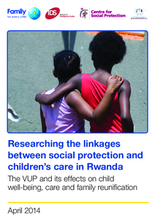This report features the results of, and recommendations based on, a study conducted in Rwanda which investigates the links between the cash transfer program “Vision 2020 Umurenge Programme (VUP),” child well-being, and children’s care and family reunification. The research is a joint initiative by Family for Every Child and the Centre for Social Protection (CSP) at the Institute for Development Studies (IDS) in the UK. Uyisenga Ni Imanzi (UNM), a Rwandan NGO and member of Family for Every Child, led the research in Rwanda.
The study sought to answer three primary research questions: (1) What are the linkages between social protection and the quality of children’s care?; (2) What is the link between social protection and the loss of parental care or family separation?; and (3) How does social protection influence decisions about foster or kinship care? VUP is an anti-poverty program in Rwanda aimed at alleviating the effects of poverty by providing cash transfers, paid employment on community asset-building projects, access to savings, credit, and financial institutions, and training to increase awareness and reach of VUP within the community. The participants in this study (over 120 adults and 90 children), were recruited from VUP and include staff members, program participants, and community members.
Among the main findings of the study, researchers discovered that the VUP plays a positive role in improving child well-being and quality of care and that the VUP can support family reunification. However, the results also suggest that services of the VUP do not benefit all children equally and that the VUP Public Works component may compromise carers' abilities to provide high quality care. Furthermore, there is a potential for misuse of the transfers on purchasing alcohol which can negatively affect household relations and children's care. Lastly, researchers also concluded that cash transfers may serve as an incentive for foster care placement and can have positive and negative effects. From these findings, the authors of the report recommend the following: strengthening the link between the VUP and social work or child protection services; firmly integrating solutions for child care and care responsibilities into the VUP and particularly into its Public Works component; and using training and sensitization within the VUP more strategically to address issues around children's care and well-being.

